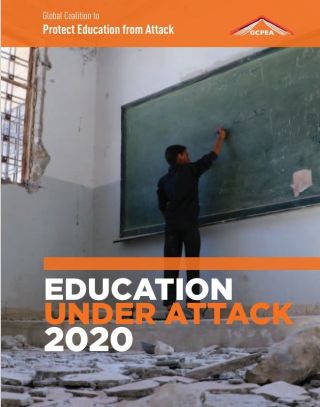Protecting Education from Attack - mobilizing action to safeguard education in armed conflict

In 2015, the governments of Norway and Argentina led a process among United Nations (UN) Member States to develop the Safe Schools Declaration, which is the only international agreement dedicated to the protection of education in armed conflict. Ireland endorsed this Declaration in May 2015. A report by the Global Coalition to Protect Education from Attack, titled 'Education Under Attack 2020, A Global Study of Attacks on Schools, Universities, their Students and Staff, 2015-2019' tracked five different types of attacks on education, as well as the military use of educational facilities:
- Attacks on schools
- Attacks on students, teachers, and other education personnel
- Military use of schools and universities
- Child recruitment at, or on the way to or from, school
- Sexual violence at, or on the way to or from, school or university
- Attacks on higher education
This report found that over two-thirds, or 7,300 attacks, which took place during the reporting period were direct attacks on schools. These attacks included arson, use of IEDs, airstrikes and ground strikes, raids and looting. Schools in the Democratic Republic of Congo and Yemen were the most heavily affected, with each having more than 1,500 school attacks between 2015 and 2019. In Syria, the United Nations reported that 40 per cent of the country's schools were damaged or destroyed between 2013 and 2019, with the UN verifying 143 attacks on schools in the first three quarters of 2019.
The report also details how military groups, including armed forces, law enforcment and other state security entities, also killed, injured, abducted, threatened, arrested and detained more than 8,000 students, teachers and other school personnel between 2015 and 2019 across the 37 countries profiled. In Cameroon, separatist armed groups attacked students and school personnel for breaking the groups' boycott on education; while in Burkina Faso, Mali and Niger, armed groups threatened teachers for using the secular state curriculum, leading to thousands of school closures throughout the region.
Military use of schools, including use of school buildings as a military base, was found in 33 of the 37 countries profiled. Child recruitment was reported in at least 16 of the profiled countries, and sexual violence at, or on the way to or from school or university, particularly among female students and teachers, was reported in 15 of the profiled countries. The testimonies from survivors of these attacks make for disturbing reading.
The authors of the report recognise that there have been some positive developments, particularly around the endorsement and implementation of the Safe Schools Declaration and positive steps by countries such as Denmark, New Zealand, Norway, the Philippines, Switzerland and the United Kingdom to prohibit or restrict the use of schools by armed forces. However, there remains much to be done, and the authors set out the following series of recommendations for the protection of education under attack by armed forces:
- States should endorse, implement and support the Safe Schools Declaration to ensure that all students and educators can learn and teach in safety.
- Armed forces and armed groups should refrain from using schools and universities for military purposes, including by implementing the Guidelines for Protecting Schools and Universities from Military Use during Armed Conflict.
- States and other monitoring bodies should strengthen monitoring and reporting of attacks on education, including disaggregating data by type of attack on education, sex, age, location, person or group responsible, number of days the institution was closed, and type of institution, to improve efforts to prevent and respond to attacks on education.
- States and international justice institutions should systematically investigate attacks on education and fairly prosecute those responsible.
- States and other institutions should provide nondiscriminatory assistance for all survivors of attacks on education, regardless of gender, ethnicity, socio-economic background, or other attributes, while taking into account their distinct needs and experiences based on gender, and potential vulnerabilities such as disability and forced displacement.
- Education providers should ensure that education promotes peace and provides physical and psychosocial protection for students, including by addressing gender-based stereotypes and barriers that can trigger, exacerbate, and result from attacks on education.
- GlobalWhere feasible, states should maintain safe access to education during armed conflict, including by working with school and university communities and all other relevant stakeholders to develop strategies to reduce the risk of attacks, and comprehensive safety and security plans in the event of these attacks.

GIVING A VOICE TO THOSE
WHO DON’T HAVE A VOICE
When you support Social Justice Ireland, you are tackling the causes of problems.
